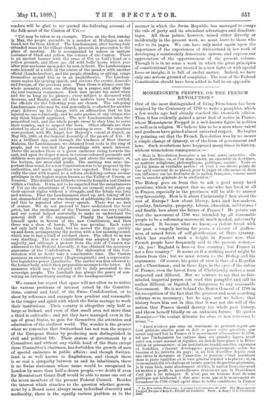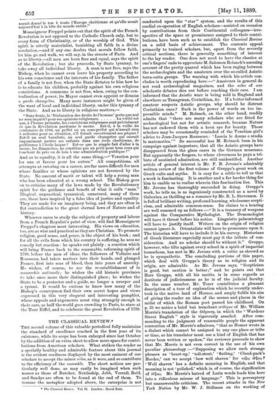MONSEIGNE1JR FREPPEL ON THE FRENCH REVOLUTION.* ONE of the most
distinguished of living Frenchmen has been inspired by the Centenary of 1789 to write a pamphlet, which a few weeks ago had already reached the twentieth edition. Thus, it has evidently gained a great deal of notice in France, where Monseigneur Freppel is a well-known figure in politics as well as in religion. We believe him to be a man whose talent and goodness have gained almost universal respect. He begins by pointing out that the French Revolution was by no means a simple change of dynasty, or of the form of government and laws. Such revolutions have happened many times in history, without tremendous consequences :— " Mais is Revolution francaise a un tout autre caractere : elle eat nne doctrine, ou, si l'on aime mieux, an ensemble de doctrines, en matiare religieuse, philosophique, politique, sociale. Voila ce qui lui donne sa veritable portee ; et c'est It ces divers points de vue qu'il convient de se placer, pour la juger en elle-meme et dans son influence sun les destinees de la nation francaise, comme aussi sun la marche generale de la civilisation."
The Bishop goes on from this to ask a good many hard questions, which we suspect that no one who has lived at all in France, especially in the provinces, will be able to answer very favourably. How is it about Christianity ? how about the rest of Europe ? how about liberty, laws and law-makers, equality, fraternity, property, labour, education, militarisme ? and finally, how about the future of France ? He points out that the movement of 1789 was intended by all reasonable people to be a reforming movement, much needed, universally welcomed. It became what we know,—a violent break with the past, a tragedy lasting for years, a victory of godless- ness, of armed force, of self-glorification, of State tyranny, which has reached such a height in France now, that French people have frequently said to the present writer,— " Ah, yes ! England is free—a free country ; but France is not a free country." It seems as if a striking moral might be drawn from this ; but we must return to the Bishop and his arguments. Of course, his point of view is that of a Royalist and a Churchman ; and in these days, in the eyes of the rulers of France, even the barest form of Christianity makes a man suspected and illiberal. But we venture to say that no fair- minded, impartial person can read this pamphlet and call its author illiberal, or bigoted, or dangerous to any reasonable Government. He is not behind the States-General of 1789 in his recognition of the fact that the greatest and most searching reforms were necessary ; but he says, and we believe that history bears him out in this, that it was not the will of the nation that France should destroy her whole past history, and throw herself blindly on an unknown future. He quotes Mounier,—" On voulait detruire les abus et non renverser le trone :"— " Aussi n'est-ce pas sans un sentiment de profond regret que tout patriots sincere pout et doit se poser cette question : que serait aujourd'hui la France silo mouvement raormateur de 1789, tel que l'indiqualent les eahiers dans ses grandee lignes, avait suivi son cours normal et regulier, an lieu do faire place It la Revo- lution en permanence; si les institutions traditionnelles, rajeunies et fortifiees, s'etaient developpees progressivement, selon les besoins et les interets du pays ; si, au lieu d'osciller depths cent ans entre la clictature et l'anarchie, le ponvoir s'etait maintentt dans le juste equilibre oft le vceu general tendait It le placer; si, en economisant dix revolutions et trente suttees de guerres glorieuses, je le venx bien, mais absolument steriles, la nation francaise avait en mettre It profit le merveilleuses ressources que la Providence s'est pin I lui menager. Ii n'est pas an homme done de sena politique qui hesiterait It dire avec none que si le mouvement re- formateur de 1789 s'etait opere dans de telles conditions, la France
• La P.(n)tution Pranpaiso d propos du Centenaire de 1789. Par Monseigneur Freppel,Eveque d'Angers, DEpute du Finistere. Paris : Roger et F. Chernovir... 1838.
aura it donne is ton k touts l'Europe chretienne et qu'elle serait aujourd'hui a la tete du monde entier."
Monseigneur Freppel points out that the spirit of the French Revolution is not opposed to the Catholic Church only, but to every form of Christianity, or of the worship of God. This spirit is utterly materialist, banishing all faith in a divine revelation,—and if any one doubts that morals follow faith, let him go and walk, we will say, in the streets of Paris. And as to liberty,—all men are born free and equal, says the spirit of the Revolution ; but she proceeds, by State tyranny, to take away all individual liberty. A man is not free, says the Bishop, when he cannot even leave his property according to his own conscience and the interests of his family. The father
of a family is not free, when the State dictates to him how he is to educate his children, probably against his own religious convictions. A commune is not free, when, owing to the cen- tralisation of power, its Mayor cannot even appoint or dismiss a garde champare. Many more instances might be given of
the want of local and individual liberty, under this tyranny of the State. And as to liberty in religious matters,—
" Sans doute, Is Declaration des droits de l'homme ' porte que nul no sera inquiete pour ses opinions religieuses La verite est que, l'heure present°, les convictions religienses sont precisement ce que In Revolution pardonne le moms. Est-il, la veille du centenaire de 1789, un prefet ou un sous-prefet qui n'aurait rien It redouter pour sa situation, s'il faisait ouvertement see piques ? Est-il un seal buraliste, un seal garde champotre qui oserait impunement mettre ses enfants dans une ecole chretienne, de preference a l'ecole laique ? Est-ce que le simple fait d'aller a, la messe, les dimanches, as constitue pas un peril pour tons ceux qui touchent de pres on de loin it une administration publique ?"
And as to equality, it is all the same thing,—" Vexation pour les uns et faveur pour les autres." All competitions, all attempts at entering on a career, are far more difficult for men whose families or whose opinions are not favoured by the State. No amount of merit or talent will help a young man who has been educated at a wrong school. The Bishop goes on to criticise many of the laws made by the Revolutionary spirit for the guidance and benefit of what it calls "man." Illogical, unpractical, tyrannical, unnatural, many of them are, these laws inspired by a false idea of justice and equality. They are made for an imaginary being, and they are often in flat contradiction to the great eternal laws of Nature and of history.
Whoever cares to study the subjects of property and labour from a French Royalist's point of view, will find Monseigneur Freppel's chapters most interesting. His views on education, too, are as wise and practical as they are Christian. To promote religion, good sense, and peace, is the object of his book ; and
for all the evils from which his country is suffering, he sees no
remedy but reaction : he speaks out plainly : a reaction which -will bring France back to the reasonable, reforming spirit of 1789, before the men of ideas, the followers of Voltaire and Rousseau, had taken matters into their hands, and plunged France, first into seas of blood, then into years of anarchy.
He wishes, of course, to see the re-establishment of la monarchic nationale ; he wishes the old historic provinces
to take once more their distinguished place ; he wishes the State to be a protector and a guide, no longer a usurper and a tyrant. It would be curious to know how many of the Bishop's countrymen find their own secret hopes and views expressed in this very eloquent and interesting pamphlet, whose appeals and arguments must ring strangely enough in their ears, as half the world goes crowding to Paris, to stare at the Tour Eiffel, and to celebrate the great Revolution of 1789.







































 Previous page
Previous page